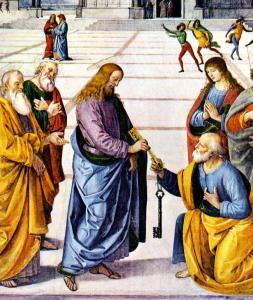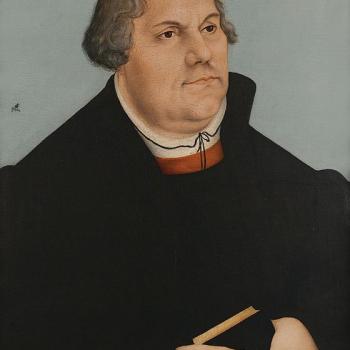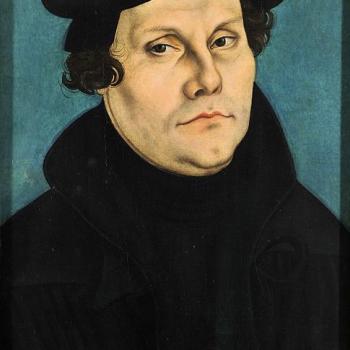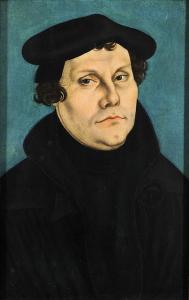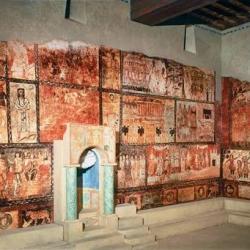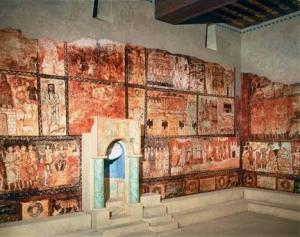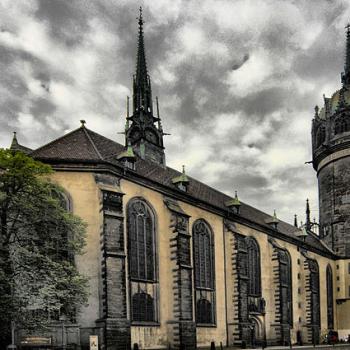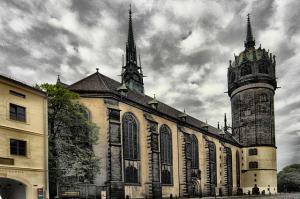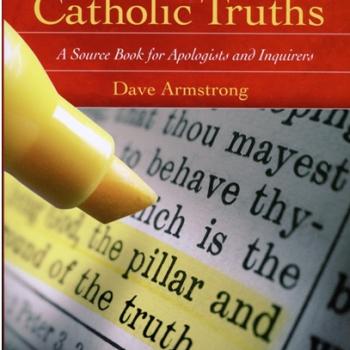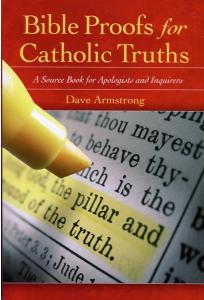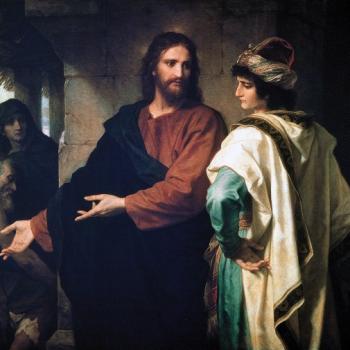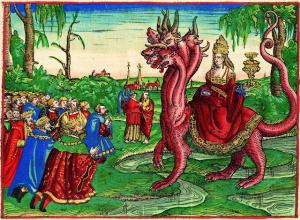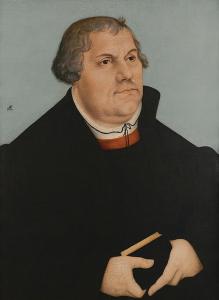
“Please Hit ‘Subscribe’”! If you have received benefit from this or any of my other 4,600+ articles, please follow this blog by signing up (w your email address) on the sidebar to the right (you may have to scroll down a bit), above where there is an icon bar, “Sign Me Up!”: to receive notice when I post a new blog article. This is sort of the equivalent of subscribing to a YouTube channel. Please also consider following me on Twitter / X and purchasing one or more of my 55 books. All of this helps me get more exposure, and (however little!) more income for my full-time apologetics work. Thanks so much and happy reading!
***
See the introduction in Part 1. James Swan’s word will be in blue.
*****
TABLE OF CONTENTS
7. Luther’s Two Conceptions and the Confusion Created Therein
8. Scholarly Consensus on Luther and the Immaculate Conception
9. How Much Did the Immaculate Conception “Matter” to Martin Luther?
10. “Secondary” Doctrine and Luther’s Extraordinary “Prophetic” Infallibility
11. Misconceptions of My Argument & Footnoting & Documentation Controversies
12. Hartmann Grisar, Bias in Historiography, and the “BEST” Protestant Material
13. Swan Song: 12 More Errors and Miscomprehensions
7. Luther’s Two Conceptions and the Confusion Created Therein
*
C. massa imperdita
. . . From Armstrong’s further comments, it’s hard to tell whether he even understands the issue. What Armstrong overlooks from his 21st Century theological perspective is that this issue was debated during the centuries previous to Luther during the development of the doctrine of the Immaculate Conception, and is a factor in understanding Luther’s perspective.
I didn’t deny that the issue was debated, so these comments are yet another non sequitur. Rather, I asserted that “the notion of a ‘pure strain through the centuries’ was never Catholic official teaching,” which is a far different proposition (“official” meaning dogmatic, conciliar, papal, magisterial teaching).
I’m not sure how Armstrong determined I engaged in heretical reasoning, since I have not put forth any of my own opinions on the Immaculate Conception.
Mr. Swan has done so publicly, elsewhere:
TertiumQuid Thu Jun-12-03 05:50 PM
#51318, “RE: Yes I do.”
In response to Reply #2. . . I actively teach that the immaculate conception is false. Just taught it this past Sunday to a group of about 30 adults.
CARM Catholic Discussion Board
(http://new.carmforums.org/dc/dcboard.php?az=show_topic&forum=107&topic_id=51307&mesg_id=51307&page=9&topic_page=1)
Just so the reader is clear where he stands (if it weren’t already obvious) . . . Arguably, this position might tend to create a bit of bias in Mr. Swan against Luther holding the view; hence perhaps this partially accounts for his opinion that Luther minimized it and then abandoned it. But his is not the only view — by any means — of scholars most acquainted with Luther’s Mariology. As a Catholic, on the other hand, what Luther believes on this or any other issue is not a direct concern of mine: he isn’t the founder of my branch of Christianity. Therefore, his views are merely interesting for historical discussion and speculation.
Mr. Swan cites Luther at length, and claims that:
. . . Luther uses this opportunity deny any notion that Mary was purified at her conception. Rather she was purified at the conception of Christ. These comments are from his Genesis Commentary, toward the end of his life in 1544:
. . . Christ was truly born from true and natural flesh and human blood which was corrupted by original sin in Adam, but in such a way that it could be healed. Thus we, who are encompassed by sinful flesh, believe and hope that on the day of our redemption the flesh will be purged of and separated from all infirmities, from death, and from disgrace; for sin and death are separable evils. Accordingly, when it came to the Virgin and that drop of virginal blood, what the angel said was fulfilled: “The Holy Spirit will come upon you and overshadow you”. To be sure, the Messiah was not born by the power of flesh and blood, as is stated in John 1:13: “Not of blood nor of the will of a man, etc.”? ? Nevertheless, He wanted to be born from the mass of the flesh and from that corrupted blood. But in the moment of the Virgin’s conception the Holy Spirit purged and sanctified the sinful mass and wiped out the poison of the devil and death, which is sin. Although death remained in that flesh on our account, the leaven of sin was nevertheless purged out, and it became the purest flesh, purified by the Holy Spirit and united with the divine nature in one Person. Therefore it is truly human nature no different from what it is in us. And Christ is the Son of Adam and of his seed and flesh, but, as has been stated, with the Holy Spirit overshadowing it, active in it, and purging it, in order that it might be fit for this most innocent conception and the pure and holy birth by which we were to be purged and freed from sin. Therefore these things are written for Christ’s sake. The Holy Spirit wanted Him to sink into sin as deeply as possible. Consequently, He had to be besmirched with incest and born from incestuous blood.[footnote 81: LW 7:13]
. . . Christ wanted his beginning to be like ours, but without sin, because he wanted to sanctify us wholly. We begin life in sin, we are conceived in sin, born in sin, no matter whether we be emperor, king, prince, rich, or poor; every human being is conceived in sin according to Psalm 51:5. Only Christ has the distinction and the honor to have been conceived by the Holy Ghost’s power. Since from our conception we are sinful, we are people whose flesh and blood and everything about us are soiled by sin, as indeed we see in ourselves; or when we look at those around us in the world, beset by evil desire, pride, multiple devils, and miserable unbelief. Thus we are conceived and born. For all of mankind is conceived and born in accord with creation’s decree, as recorded (Gen. 1:28): “Be fruitful, and multiply, and replenish the earth.” Christ could not be subject to such impure sinful conception and birth. He, indeed, was a genuinely true, natural human being, but not conceived or born in sin as all other descendants of Adam. That is why his mother had to be a virgin whom no man had touched, so that he would not be born under the curse, but rather conceived and born without sin, so that the devil had no right or power over him. Only the Holy Spirit was present to bring about the conception in her virgin body. Mother Mary, like us, was born in sin of sinful parents, but the Holy Spirit covered her, sanctified and purified her so that this child was born of flesh and blood, but not with sinful flesh and blood. The Holy Spirit permitted the Virgin Mary to remain a true, natural human being of flesh and blood, just as we. However, he warded off sin from her flesh and blood so that she became the mother of a pure child, not poisoned by sin as we are.[footnote 82: Martin Luther, Sermons of Martin Luther, Vol. 3, ed. John Nicholas Lenker. ( Grand Rapids: Baker Books, 1996), 291]
Mr. Swan apparently thinks this is some sort of knockout punch to my assertion (in agreement with many Protestant scholars) that Luther held to some form of the Immaculate Conception his entire life. But he neglects to see that I have already answered this sort of reasoning. It seems that I have to so often cite my words and those I have quoted at least twice before Mr. Swan will realize what, in fact, I have argued (emphases added this time):
William J. Cole, in his influential article, “Was Luther a Marian Devotee?”, picks up an important and relevant point . . .: one plausible theory about the interpretation of Luther’s seemingly contradictory remarks about the Immaculate Conception (pp. 121-123):
The objections brought up against Luther’s retention of belief in the Immaculate Conception can usually be solved by the distinction he repeated so many times between the active and passive conceptions on the one hand and the inchoative and perfect passive conception on the other. The active conception, i.e., the generative act on the part of the parents, to which corresponded the beginning or inchoative passive conception on the part of the offspring, interested Luther only inasmuch as he thought along with Augustine that it is by this means that original sin is transmitted. For him this is only the physical conception, i.e., of the body before the animation or the infusion of the soul. Although for moderns, it is difficult even to speak of the body’s being the subject of sin apart from the soul, Luther apparently saw no difficulty in attributing original sin to Mary, but not to Christ, in this sense. [cf. WA 4, 693; 10 (3), 331; 46, 136; 47, 860] But with regard to the infusion of the soul in the perfect passive conception, in which the person comes into being, Luther would not admit any original sin in Mary.
Further down, Mr. Swan acknowledges that Cole’s research is worthwhile, in the context of discussing:
. . . the necessary distinctions between the 1854 dogma, and other types of views. Quite frankly, the only studies that Armstrong utilized that were worthy of discussing this topic were O’Meara’s and Cole’s.
But I also cited Lutheran scholar Eric W. Gritsch:
Luther . . . regarded her Immaculate Conception as “a pious and pleasing thought” that should not, however, be imposed on the faithful. (in The One Mediator, the Saints, and Mary, Lutherans and Catholics in Dialogue VIII, edited by H. George Anderson, J. Francis Stafford, Joseph A. Burgess, Minneapolis: Augsburg Fortress Press, 1992, p. 241)[footnote 43; p. 382: “‘Haec pia cogitatio et placet.’ Exposition of the Ninth Chapter of Isaiah, 1543/44. WA 40/3:680.31-32. Two scholars doubt whether Luther affirmed the doctrine of the Immaculate Conception of Mary: Preuss (n. 11 above came to the conclusion that Luther rejected the doctrine after 1528; O’Meara states that “it is likely, but not certain” that Luther rejected the doctrine (118 [n. 11 above]). But Tappolet (32 [n. 1 above]) demonstrated with the use of texts that Luther did not change his mind. The literary evidence from Luther’s works clearly supports the view that Luther affirmed the doctrine, but did not consider it necessary to impose it.”]
Other similar examples can be consulted in my previous paper. Why repeat everything?
One can see from the context, Armstrong is mistaken.
One can see, by presenting my citations from both Catholic and Lutheran scholars — now for the second time –, that Mr. Swan’s view is contrary not only to my opinion, but (much more importantly) to theirs.
A careful reading will not support an 1854 version of the Immaculate Conception, thus Luther did not hold a lifelong commitment to the Roman Catholic dogma of the Immaculate Conception.
Of course, I did not assert that (if Mr. Swan or any reader mistakenly thinks I did). I asserted that he held to some form of it, and that some scholars (i.e., Schimmelpfennig, a Catholic, and Algermissen and Heiler, Lutherans) believe he held to the Immaculate Conception as described in the 1854 Catholic dogma throughout his entire life.
Nor will this quote support any concept of the Immaculate Conception in which Mary was purified at her conception. One will note from the quote above, Mary’s conception is never mentioned.
It’s true that Mary’s conception is not mentioned. But on the other hand, because Mr. Swan does not seem to understand Luther’s view of the two conceptions (one of body and blood; the other of the soul), he sees contradictions here where there probably are none (though with Luther, certainly contradiction is always a distinct possibility).
At one point Armstrong offers his own commentary and quote to substantiate Luther’s lifelong commitment to the Roman Catholic dogma of the Immaculate Conception:
Again, Mr. Swan is claiming that I asserted something which I never asserted or argued. Quite the contrary:
His views of Mary as Mother of God and as ever-Virgin were identical to those in Catholicism, and his opinions on the Immaculate Conception, Mary’s “Spiritual Motherhood” and the use of the “Hail Mary” were substantially the same.I have not discovered a single scholar who treats this subject who denies that the early Luther believed in the Immaculate Conception in some form.
Mr. Swan criticizes my citation of Luther’s Mariological statement, from Against the Roman Papacy: An Institution of the Devil, (1545):
It is obvious from the context that Luther’s statement on Mary is highly rhetorical and sarcastic . . . Using this reference to substantiate Luther’s lifelong commitment to the Roman Catholic dogma of the Immaculate Conception is quite a stretch.
Note again the false portrayal of what I was arguing . . .
Mr. Armstrong needs to pay closer attention to context. Simply looking for a phrase that seems to say what he wants to prove is not cogent argumentation.
The only problem is that William Cole draws the same conclusion, citing this passage. Cole wrote one of the most extensive and widely-cited articles about Luther’s Mariology, and even Mr. Swan speaks highly of him:
O’Meara’s brief study is one of the better historical inquiries of Luther’s Mariology from a Roman Catholic perspective, if only because of expanded content (usually missing from any examination of this issue, Cole excluded).
So if I am to be severely criticized for using this quote, all I am asking is that Mr. Swan also go after the scholar from whom I discovered this particular argument. I agree that the source is probably the weakest one I provided for my argument, but I am not convinced that it loses all force whatsoever because it occurs in a sarcastic context.
8. Scholarly Consensus on Luther and the Immaculate Conception
*The primary argument that Mr. Armstrong utilizes to prove Luther’s lifelong commitment to the Immaculate Conception is scholarly consensus . . . The primary error with Armstrong’s list is that he doesn’t distinguish between all those scholars who deny Luther held to an 1854 dogma of the Immaculate Conception from [sic] those who do. Hilda Graef, Walter Tappolet, and Max Thurian deny Luther held a lifelong commitment to the 1854 dogma of the Immaculate Conception.
*
This (overall paragraph) is untrue, and obviously so, as I made the following summary (note the last three: the only scholars whom I claimed believed that Luther held to the 1854 dogma):
I shall list the scholars from least convinced about the later Luther to most convinced: even to the point where it is thought his view was identical to that of the Catholic dogma proclaimed ex cathedra in 1854:
1. Hartmann Grisar (Catholic): Luther rejected the Immaculate Conception after 1528 or so.
2. Horst-Dietrich Preuss (Lutheran): Luther rejected the Immaculate Conception after 1528 or so.
3. Thomas A. O’Meara (C): later rejection “likely, but not certain.”
4. Hilda Graef (C): probably accepted, but in somewhat diluted form.
5. Arthur Carl Piepkorn (L): “life-long” accceptance “(barring two lapses).”
6. Walter Tappolet (C): accepted (yes).
7. Max Thurian (Reformed): yes.
8. William J. Cole (C): yes.
9. Eric W. Gritsch (L): yes.
10. Jaroslav Pelikan (L): yes.
11. Richard Marius (probably Protestant of some sort): yes.
12. 10 Catholic scholars on the Lutheran-Catholic Dialogue Committee (C): yes.
13. 11 Lutheran scholars on the Lutheran-Catholic Dialogue Committee (L): yes.
14. Reintraud Schimmelpfennig (C): yes, in the same sense as the infallible Catholic dogma proclaimed in 1854.
15. K. Algermissen (L): yes, in the same sense as the infallible Catholic dogma proclaimed in 1854.
16. Friedrich Heiler (L): yes, in the same sense as the infallible Catholic dogma proclaimed in 1854.
Jaroslav Pelikan never gave his opinion in the works Armstrong cited.
This is a false statement as well, as I documented:
A few pages later, Gritsch notes about recent Lutheran opinion on the Immaculate Conception and Luther’s espousal of it:
Jaroslav Pelikan and Arthur Carl Piepkorn may well represent the reaction of contemporary ecumenically committed Lutherans toward this dogma. Pelikan viewed the dogma as the completion of “the chain of reasoning begun by the surmise that the sinlessness of Jesus . . . depends upon His being free of the taint that comes from having two parents. Now Mary may conceive immaculately because she herself has been conceived immaculately.”
[footnote 77; p. 384: “The Riddle of Roman Catholicism (New York and Nashville: Abington, 1959), 131-21.”]
([in The One Mediator, the Saints, and Mary, Lutherans and Catholics in Dialogue VIII, edited by H. George Anderson, J. Francis Stafford, Joseph A. Burgess, Minneapolis: Augsburg Fortress Press, 1992], p. 246)
Arthur Piepkorn says that he “seems” to have held to a lifelong belief in the Immaculate Conception, but does not specify what that means. Richard Marius uses similar vague language to Piepkorn, and likewise gives no analysis at how he arrived at his conclusion. “Seems” is not a definite way of speaking, and its no wonder neither of these men provide analysis of the topic.
I see, so we must, then, accept Mr. Swan’s word on this question over against one of the most prominent Lutheran scholars and translators of Luther’s works, and a recent major Luther biographer? Very interesting . . . “Seems” is a scholarly way of speaking, free from the excessive, insufficiently-proven dogmatisms of Mr. Swan’s way of expressing himself. As for a lack of “analysis,” I only note that Mr. Swan has passed over the analysis of Luther’s notion of two conceptions, which is crucial to the topic and in understanding Luther’s view. Perhaps he does treat that aspect below [he did not, I later discovered], but if so, he has inexcusably neglected to mention it in the context where it was extremely relevant.
Reintraud Schimmelpfennig study is said to be in error by Tappolet and Graef.
Scholars disagree with each other! Another astounding revelation from Mr. Swan . . .
No analysis is provided of the only positions that should matter to Armstrong, those of Friedrich Heiler and K. Algermissen. How did they arrive at Luther holding to the 1854 dogma? Which texts did they use?
Later, Mr. Swan wrote:
He cites three scholars whom he is certain believe Luther held to the 1854 dogma . . . Unfortunately, Armstrong offers no substantiation or discussion from these authors. This would have been pertinent information.
If I had that information, I would have provided it. I think most people would find it interesting that two Lutheran scholars (as well as one Catholic scholar) came to this position.
Interestingly, these two scholars are the definite minority view, and the view which should be most important to Armstrong.
I was not trying to prove the dogma itself; I was only doing a study of what scholars believed Luther held with regard to the dogma. Thus it is completely irrelevant to make statements about what should be “most important” to me in a purely historical study. I guess this statement flows from Mr. Swan’s previous misunderstanding, whereby he thought I was attempting to prove that Luther held to the 1854 dogma.
Almost laughable were these scholars put forth by Armstrong: “10 Catholic scholars on the Lutheran-Catholic Dialogue Committee… 11 Lutheran scholars on the Lutheran-Catholic Dialogue Committee (L): yes.”
I fail to see the humor. It is certainly relevant (and, I think, fascinating and noteworthy) if an impressive panel of scholars, in the process of a major ecumenical undertaking, agree that “Luther himself professed the Immaculate Conception as a pleasing thought though not as an article of faith.”
No analysis was provided by twenty of these men,
Probably because they produced a creedal statement, and individual opinions from all the participants were not included in the book. Perhaps Mr. Swan expects me to contact all by phone and conduct lengthy interviews, so that my paper will not be so “laughable”? If anything is “laughable,” it is that Mr. Swan cited the same group himself, in a public post on a Protestant discussion board:
TertiumQuid Sat Jun-28-03 06:27 AM
#55787, “Christ the Judge and Mary the Merciful”
Edited on Sat Jun-28-03 06:28 AM by TertiumQuidDuring the Middle Ages Christ was viewed as Judge, while Mary was seen as a great merciful protector, in some instances “deified.” Luther for instance, dreaded Christ the severe judge . . .
The Lutheran and Catholics in Dialogue scholars noted that,
“Luther was convinced that the practice of invoking the saints only continued the medieval tendency to transform Christ the “kindly Mediator” into a “dreaded Judge” who is to be placated by the intercession of the saints and Mary, and by a multitude of other rites.” Lutherans and Catholics in Dialogue VII, 25.
CARM
(http://new.carmforums.org/dc/dcboard.php?az=show_topic&forum=107&topic_id=55787&mesg_id=55787&page=)
Note that (just as in my quote), “no analysis was provided” by the panel. The only difference is that in the first instance they agreed with my position, and in the second they agreed with Mr. Swan’s position. When the latter occurs, they are used by Mr. Swan for his polemical purposes. When the former occurs, however, the same group of men and their scholarly opinions somehow devolve into the spectre of being “laughable.” Perhaps Mr. Swan can explain how his reasoning works in making such bogus distinctions?
Note Gritsch never affirms Luther held to the 1854 dogma.
As I noted this in my own paper, it is no news to me. But he does affirm that Luther held to the Immaculate Conception in some form his entire life (my own position), and this differs from Mr. Swan’s position. Again, in such matters, I defer to the eminent Lutheran scholar and translator of Luther’s works, not a seminary student with a polemical interest.
Some form? It is obvious these scholars understand Luther is not ascribing to the 1854 dogma.
Indeed it is. Then why mention it?
George Yule denies Luther held the Immaculate Conception.
Ian Siggins denies Luther held the Immaculate Conception.
Ewald Plass denies Luther held the Immaculate Conception.
Anna Paulson denies Luther held the Immaculate Conception.
George Merz denies Luther held to the Immaculate Conception.
Reinhold Seeberg denies Luther held to the Immaculate Conception.
Assuming these scholars take a position similar to that of Grisar, Preuss, and O’Meara, then that would make the new grand total: 31 affirmative, 8 negative. I think scholarly consensus is relevant to any discussion. And it is relevant even before specific argumentation is presented, simply by virtue of the fact that they are scholars, who can be presumed to have done their research. Not all statements are arguments.
This is simply a ridiculous way to approach this issue without providing the necessary distinctions between the 1854 dogma, and other types of views.
Since I did indeed provide that necessary distinction, I submit that Mr. Swan’s modus operandi is the one arguably “ridiculous” here. Straw men always are . . .
9. How Much Did the Immaculate Conception “Matter” to Martin Luther?
*It is obvious that the Immaculate Conception is important to Armstrong.
*
Indeed it is, but not simply on the grounds that I write about it a lot. Mr. Swan also writes about it quite a bit, but it is not important to him, because he doesn’t believe it. I write more about sola Scriptura than anything else, as a Catholic apologist. It is important to me only as something to refute. But in historical discussions, history itself (or how the facts of it can best be ascertained) is what is important. These two papers are historical studies — no more, no less.
It is also obvious that Luther engaged the topic so infrequently that one can only conclude he was not overly concerned with it.
It is not so obvious to scholars who have studied Luther’s views. If he dealt with it once, that would be one time more than virtually all Protestant pastors today deal with it.
1518:
“Second, even if the pope along with a large part of the church should feel thus and so, and even if it were true that he does not err, it is still not a sin, nor is it heresy, to take the opposite position, especially in something which is not necessary for salvation, until the one position has been rejected by a general council and the other approved. But, lest I become too involved, let me state that my position is proved in this one instance, namely, that the Roman church along with the general council at Basel and almost with the whole church feels that the Holy Virgin was conceived without sin. Yet those who hold the opposite opinion should not be considered heretics, since their opinion has not been disproved.”(LW 31:172-173)
This doesn’t prove that the Immaculate Conception did not “matter” much to Luther, as Mr. Swan states. What it proves is that he thought it shouldn’t be a dogma, and that those with contrary opinions should not be considered heretics. Would that the Calvinist Synod of Dort had been so tolerant toward the Arminian Remonstrants . . . Catholics obviously think it should be a dogma. But the fact that Luther did not (which I have also noted more than once previously), doesn’t prove that Luther considered the doctrine unimportant. That would be as foolish as arguing that the Catholic Church didn’t consider Mary’s Assumption important till 1950, when it was defined at the highest level of authority (the same would apply to the Immaculate Conception before 1854 and papal infallibility before 1870).
1521:
“In regard to the conception of our Lady they have admitted that, since this article is not necessary to salvation, it is neither heresy nor error when some hold that she was conceived in sin, although in this case council, pope, and the majority hold a different view.? Why should we poor Christians be forced to believe whatever the pope and his papists think, even when it is not necessary to salvation? Has papal authority the power to make unnecessary matters necessary articles of faith, and can it make heretics of people in matters which are not necessary for salvation?”(LW 32:79-80)
The same argument I made in my last statement applies here.
10. “Secondary” Doctrine and Luther’s Extraordinary “Prophetic” Infallibility
*Without getting into a huge, multi-faceted discussion about infallibility, authority, sola Scriptura, Tradition, the proper, reasonable extent of binding dogma, etc., I would simply throw Luther’s principle back upon himself. He moans: “Why should we poor Christians be forced to believe whatever the pope and his papists think, even when it is not necessary to salvation?” Very well, then: why should we poor non-Protestant Christians “be forced to believe” whatever Luther and his Lutherans believe? Here are a few examples:
If your Papist makes much unnecessary fuss about the word (Sola, alone), say straight out to him, Dr. Martin Luther will have it so, and says, Papists and donkeys are one and the same thing. Thus I will have it, thus I order it, my will is reason enough . . . Dr. Luther will have it so, and . . . he is a Doctor above all Doctors in the whole of Popery. (in Henry O’Connor, Luther’s Own Statements, New York: Benziger Bros., 3rd ed., 1884, 25; Letter to Wenceslaus Link, 1530)I am certain that I have my teaching from heaven. (in O’Connor, ibid., 19; Against Henry VIII, King of England, 1522)
Whoever teaches differently from what I have taught herein, or condemns me for it, he condemns God, and must be a child of Hell. (in O’Connor, ibid., 15; Against Henry VIII, King of England, 1522)
. . . from now on I shall no longer do you the honor of allowing you—or even an angel from heaven—to judge my teaching or to examine it. (Against the Spiritual Estate of the Pope and the Bishops Falsely So-Called, July 1522. Martin Luther, Luther’s Works, edited by Jaroslav Pelikan [volumes 1-30] and Helmut T. Lehmann [volumes 31-55], St. Louis: Concordia Pub. House [volumes 1-30]; Philadelphia: Fortress Press [volumes 31-55], 1955. This work from Volume 39: Church and Ministry I (edited by J. Pelikan, H. C. Oswald, and H. T. Lehmann); pages 239-299; translated by Eric W. and Ruth C. Gritsch; this quote from p. 248)
I shall not have it judged by any man, not even by any angel. For since I am certain of it, I shall be your judge and even the angels’ judge through this teaching (as St. Paul says [I Cor. 6:3 ]) so that whoever does not accept my teaching may not be saved — for it is God’s and not mine. Therefore, my judgment is also not mine but God’s. (Ibid., p. 249)
For much, much more material along these lines, see: Martin Luther the “Super-Pope” (?) and de facto Infallibility (?): With Extensive Documentation From Luther’s Own Words [11-13-02; rev. 5-15-03 and 6-18-06]
Luther himself admits that “the Roman church along with the general council at Basel and almost with the whole church feels that the Holy Virgin was conceived without sin.” Despite that, he would like this belief to not be binding on the faithful, and desired that dissenters should not be called “heretics.” How, then, does his rhetoric above fit into this scenario? It’s okay to not believe in the Immaculate Conception, even though Luther accepts it and the “majority” and “almost the whole Church” does too, yet anyone who disagrees with Luther (alas, even an “angel from heaven”) or dares to even “examine” his teaching, is a “child of hell” who “condemns God” simply because Luther is a self-proclaimed, self-anointed “Doctor above all Doctors”, whose judgment and doctrine is, in fact “God’s”? This is very curious reasoning. But Luther was never accused of being logically consistent.
Who is being overly dogmatic here? Luther condemned, for example, fellow “reformer” Zwingli, because he didn’t accept the Real Presence in the Eucharist. He thought Zwingli was “damned” and “out of the Church” (because, as we know, all Luther’s teaching was straight from God and thus obviously super-infallible in a fashion far beyond any papal proclamation ever was). So according to Luther, Mr. Swan himself must be damned, since if he held to Calvin’s “mystical presence” view of the Eucharist, he would (like Zwingli) be at odds with Luther. But I would not be damned in Luther’s eyes for believing in the Immaculate Conception. I certainly would be on other grounds, though, because I am outrageously arrogant enough to not believe that Luther is a super-infallible super-pope and super-prophet or a “Doctor above all Doctors”.
Mr. Swan’s master, John Calvin took a few shots at Luther:
What to think of Luther I know not . . . with his firmness there is mixed up a good deal of obstinacy . . . Nothing can be safe as long as that rage for contention shall agitate us . . . Luther . . . will never be able to join along with us in . . . the pure truth of God. For he has sinned against it not only from vainglory . . . but also from ignorance and the grossest extravagance. For what absurdities he pawned upon us . . . when he said the bread is the very body! . . . a very foul error. What can I say of the partisans of that cause? Do they not romance more wildly than Marcion respecting the body of Christ? . . . Wherefore if you have an influence or authority over Martin, use it . . . that he himself submit to the truth which he is now manifestly attacking . . . Contrive that Luther . . . cease to bear himself so imperiously. (in John Dillenberger, editor, John Calvin: Selections From His Writings, Garden City, New York: Doubleday Anchor, 1971, 46-48; from Letter to Martin Bucer, January 12, 1538)
I am carefully on the watch that Lutheranism gain no ground, nor be introduced into France. The best means . . . for checking the evil would be that the confession written by me . . . should be published. (Dillenberger, ibid., 76; from Letter to Heinrich Bullinger, July 2, 1563)
We readily see how far Protestantism has advanced in unity since those heady days! Where now all are marvelously united and doctrinal latitudinarianism largely prevails, in the beginning Calvin could call Luther an enemy of “the pure truth of God” possessed of ignorance and the grossest extravagance, and Lutheranism “evil.”
It is refreshing, at least (in one sense), to see that the earliest Protestants were consistently anti-[other]Protestant[s] as well as anti-Catholic. See: Protestant Inquisitions: “Reformation” Intolerance & Persecution [June 1991; rev. 10-31-03, 3-7-07, 9-14-17], for numerous examples of this sort of intolerance and hypocrisy; strange from men who rail loudly against Catholic “dogmatism” and excessive binding of men’s consciences, and who ostensibly, supposedly champion the freedom of the individual and private judgment.
11. Misconceptions of My Argument and Footnoting and Documentation Controversies
*Armstrong seems to realize that it’s highly probable that Luther did not hold to a position similar to the 1854 dogma,
*
Now Mr. Swan finally “gets” it, but in doing so, contradicts his earlier assessment of my beliefs in this regard (e.g., “Using this reference to substantiate Luther’s lifelong commitment to the Roman Catholic dogma of the Immaculate Conception is quite a stretch”).
He’s content that Luther held to some form of the Immaculate Conception; the fact that it doesn’t take the form of the 1854 dogma does not seem to be a concern.
Why would it be, in a purely historical discussion (whose aim is simply to determine the facts of history)? That no more concerns me than does the historical fact that St. Thomas Aquinas also took a different view than the 1854 definition of the dogma. But Mr. Swan seems quite hung up on this. Perhaps that is because he is finding it difficult to successfully refute the facts and arguments I have presented?
It’s fairly obvious from my citations above that Luther moved further away from a doctrine similar to that put forth in 1854.
It’s not quite so obvious to many Catholic and Lutheran scholars. I give their opinions much more credence than Mr. Swan’s (no offense). The supposed change in Luther’s opinion has been explained, now twice (but ignored by Mr. Swan in his latest paper), in terms of Luther’s notions of two distinct conceptions for every person.
What Armstrong ends up doing is presenting that either Luther held to some form of the Immaculate Conception, or the 1854 dogma his entire life.
I did the former (and I didn’t “end up” with this position; I have held it for approximately 12 years now). Mr. Swan needs to learn the distinction between one’s own views and a presentation of the views of others — in this case, those of scholars (the “survey” or overview of the literature” approach). I will simply refer readers to the most relevant section of my previous paper (rather than repeating arguments endlessly because Mr. Swan oddly refuses to deal with them in his huge paper):
*
VIII. The Use of Footnotes in My Paper and Mr. Armstrong’s Response
The form of my footnotes annoyed Mr. Armstrong.
Not quite. Rather, it was the double standard employed by Mr. Swan in his criticism of my use of footnotes (after one looked at how he often used his).
If any will take the time to look over my footnotes, one will see that the majority are references to the English edition of Luther’s Works.
That’s fine. I was simply asking that he give the name of the source cited (“Sermon on Christmas, 1534,” etc.).
Indeed, it is expected that anyone wishing to study Luther should have Luther’s Works. These volumes are readily available.
I can hardly afford a 55-volume set (even used — but I have never seen it used), as I am a relatively poor apologist with a wife and four children to feed. I would love to have this set. Perhaps Mr. Swan would consider a donation to my ministry, since we are both very interested in Martin Luther? Meanwhile, I have to drive ten miles to a library to consult it. I’ve dealt with most of Mr. Swan’s objections concerning footnoting already, and the discussion is tedious for readers, but I will offer a few more comments:
Mr. Armstrong though takes a different approach in his Luther research. In version #3 of his response he references the German Weimar edition 33 times (he cites the English Luther’s Works only 4 times).
I cite whatever source my scholarly source cites, in the desire for thorough documentation in my research. Paul Althaus, in his standard work, The Theology of Martin Luther (translated by Robert C. Schultz, Philadelphia: Fortress Press, 1966) usually cites the Weimar edition (WA). One would expect this, since he originally wrote in German. LW [“Luther’s Works“] (the English set) is also often cited (perhaps added by the translator), but oftentimes, only the reference to WA is listed.
Does that mean that all these references are somehow suspect or inadequately documented because they don’t refer to LW? Or that we shouldn’t cite them till we can get a solid English reference? I understand that WA is much larger than LW, so citing the former without the latter will often be necessary. My point is that there is nothing intrinsically wrong with, or suspect (in terms of scholarly competence), in doing this. This work is an English translation, after all, yet doesn’t always give a reference to an English edition of Luther’s writing.
I ask any to compare my footnotes with any of Mr. Armstrong’s Luther pages. As an example, please see Mr. Armstrong’s footnotes for his on-line Paper “Martin Luther: Beyond Historical Myth to Fact.” Primary references to Luther are mostly to Luther’s Works in German.
Again, I simply gave the references as I had them. If Mr. Swan wants to claim that the scholars are not to be trusted, that is another issue. Mr. Swan acts as if this is some terrible thing, when, in fact, it is quite common. I shall illustrate by citing the examples of just five works I have in my library, all written or edited by non-Catholic scholars:
1. Here I Stand, by Roland Bainton (New York: Mentor, 1950): probably the most well-known and widely-read biography of Luther, gives no less than 27 references (which he uses often) on page 315: most in German, some in Latin, none in English. He refers to WA dozens of times, if not well over a hundred times. Granted, the 55-volume English set was not yet available, but there was at least a smaller set (Philadelphia: Holman, 1930 ff., six volumes — I have four volumes in my library) to which he does not seem to ever refer.
2. Luther’s Progress to the Diet of Worms, by Gordon Rupp (London: S.C.M. Press, 1951), another famous book, likewise routinely cites the WA (at least 59 times in just the first two chapters: pages 9-35), as well as numerous German and French works. What is interesting is that he also lists the Philadelphia edition of Luther’s works in English in his “Abbreviations,” yet does not cite it nearly as often as WA. I didn’t notice it in the first two chapters. He does cite it more later on, but less than WA, which is the point. And the Harper Torchbook edition was from 1964, so the references to the 1955 LW could have easily been added on. Mr. Swan cites Rupp’s negative opinion of Hartmann Grisar.
3. Young Man Luther, by Erik Erikson (New York: W.W. Norton & Co., 1958), another famous work, uses exclusively German editions of Luther’s works and not the English editions, even though the 55-volume set was then published.
4. Likewise: Luther: Early Theological Works, edited and translated by James Atkinson (Philadelphia: Westminster Press, 1962). The author writes on page 365: “All references to the Luther text are made to the Weimar text, volume, page, line, and where significant to the title and date of the work cited.” Mr. Swan cites Atkinson’s negative opinion of Hartmann Grisar.
5. Alister E. McGrath, Luther’s Theology of the Cross (Grand Rapids, MI: Baker Books, 1985): we find exclusive reference to the German Weimar edition (WA). The English edition is not used at all.
Once again, then, we see that Mr. Swan’s criticisms fall flat, as I was doing nothing other than what a great many Luther scholars (in fact, arguably the very best) do. No one is obliged to always cite the English versions. If they were, then the six works cited above are immediately suspect. If they are not suspect, then neither is my work (i.e., simply on this basis — I am not a scholar, and am not trying to imply that I am).
Readers can immediately see that such a “requirement” is entirely absurd, for it would mean that if any of the prominent books above were cited, along with the German primary reference given, that this would be somehow methodologically-deficient simply by virtue of that fact. Since this can hardly be the case, Mr. Swan’s objection collapses. The English edition was also “readily available” to scholars like McGrath and Atkinson, yet they chose not to use it. And I take it that they could afford it if they wanted a copy (unlike myself).
Similarly, A large amount of Mr. Armstrong’s Luther references are given merely as titles of a particular treatise, with the readers’ job being the arduous task of tracking down a volume that contains said treatise.
On the other hand, Mr. Swan habitually cites the primary source (LW) but not the name of the tract or book or sermon (which might then be able to be located in other collections of Luther’s writings that one might have — I possess approximately 26 books by or about Luther and many more about the Protestant Reformation in general). That was my complaint. It was not a major aspect of my paper at all; it was simply a response to his complaint about my own methods in documentation.
Either Mr. Armstrong is fluent in German or Mr. Armstrong does not have the most basic tool for Luther studies: the English edition of Luther’s Works, so he relies on secondary sources . . .
It is true that Mr. Armstrong does not know German (nor does he wish to). It is also true that Mr. Armstrong (being a devoted, less-than-rich apologist and writer) does not possess Pelikan’s Luther’s Works, and that Mr. Armstrong often relies on secondary sources. It is also true that people like Dr. McGrath probably know German and do have the set; however, the bulk of Dr. McGrath’s English readers do not know German, so it remains for Mr. Swan to explain why Dr. McGrath does not utilize the English set at all; he doesn’t even cross-reference it to the German set, as, for example, the Althaus English translation often does. Thus, Dr. McGrath (like the hapless Mr. Armstrong) — to use Mr. Swan’s words — “complicates the task of any [non-German readers] who would check his references or contexts.” Thus Mr. Swan ought to criticize Dr. McGrath (and others like him) for the same “shortcoming.” But we are not surprised to see that he does not.
For my part, I’m much more interested in the beliefs of Luther than in this sort of “majoring on the minors” nitpicking nonsense, but so it often goes in Catholic-Protestant discussions (unfortunately). It’s not my choice.
Mr. Armstrong’s response provided many references that are virtually impossible to track down. One wonders why these sources were offered.
Because scholars offered them, and one purpose of scholars is to inform their readers of subjects, with documentation. If I hadn’t offered the further documentation, we can be sure that Mr. Swan would have vigorously criticized “Mr. Armstrong’s appalling lack of necessary documentation (!!!!!).”
Mr. Swan then curiously includes in his examples of “difficult” sources:
“Was Luther a Devotee of Mary?” Marian Studies, 21, 1970; Marian Studies 18 (1967)
This is the article by William Cole, which Mr. Swan cites several times, and even commends, so I find it fascinating that it is now being criticized as “impossible to track down” (I found it in the same theological library where I could also consult Luther’s Works in English), and Mr. Swan wonders “why” the source was offered. Well, it was obviously offered because it is one of the major pieces on Luther’s Mariology! I should think that would be more than sufficient reason and justification to cite it, regardless of how “difficult” it might be to track down.
In contrast, I have made the readers’ task of locating a context for Luther’s words quite easy; all you need is access to Luther’s Works, which are available in many college libraries, and some public libraries. Used volumes can still be purchased, even singularly (individual volumes can be as cheap as $15-25).
I see. Even at the lowest price, the set comes in at $825. Perhaps Mr. Swan grew up in (and lives in) considerably more affluence than I did (and do). For most non-upper class persons, paying that much for a set of books is not that easy of a task. I appreciate all the references; all I’m saying is that they are not necessary, and that one would prefer that the sermons and tracts were identified with something beyond “LW xx:xxx.”
Mr. Swan then recounts the “Luther quote” controversy that I described above. It seems to be his desire to try to “embarrass” me by showing how shoddy my research is:
In his first response to my paper, Armstrong said he had done the search and found English references: “Luther’s works, ed. Jaroslav Pelikan, volume 4, 694.” He seemed fairly confident he had succeeded in proving my total incompetence. Not only was he able to find Catholic sites providing a reference, he found those references to be for the English edition of Luther’s Works.
This of course proved to be a bogus reference. Volume 4 does not have a page 694 . . . Perhaps if Mr. Armstrong had Luther’s Works to check his research, this embarrassment could have been avoided.
Towards this end, we find the following exchange on a board filled with anti-Catholics:
Re: Luther on Mary Tertiumquidd. . . I made mention of checking the versions of Luther’s Works to not further embarrass Mr. Armstrong who posted a non-existent reference as a response to my paper. I know the English version has a uniformity to it.
. . . It is amazing to me how little Luther discussed the Immaculate Conception, and how big of a deal certain RC apologists make out of one Luther quote they can’t produce a context for, nor is the date “1527” even certain.
Edited by: Tertiumquidd at: 5/2/03 4:48:14 pm
Areopagus Board
(http://pub84.ezboard.com/fntrmindiscussionboardfrm9.showMessage?topicID=186.topic&index=1)
As I recall, Mr. Swan was challenging me to find a primary reference source for the 1527 sermon on the Immaculate Conception (which Catholic historian and Luther biographer Hartmann Grisar cited). I found two on the Internet which listed a volume and page number in the English edition. It turns out that the volume and page number were incorrectly listed from one of the German editions and wrongly attributed to the English edition. I noticed this later in my research — that the reference lined up with a German citation. Mr. Swan has since made much of this, along with the fact that I revised my paper, as if this were some extraordinary or scandalous thing. But I see it as a simple human error. My mistake was in passing on the mistaken information.
The ironic and somewhat humorous part of all this, however, is Mr. Swan’s second paragraph above, where he suggested that even the date of this sermon was not “certain” (because he could not find it in the English edition of Luther’s Works — it is only in the German Weimar edition [WA, 17, II, 287-289]; and in other German collections as well, such as the Erlangen set). So he commits an error at least as (if not more) serious as the botching of the source (from a German edition rather than the English). Of course it is indeed from 1527, as I have since verified, under Mr. Swan’s challenge and failed attempt to “embarrass” me:
Thomas A. O’Meara (whose research Mr. Swan has commended), wrote:
In 1527 Luther preached a long sermon on the conception of Mary.
Lutheran Eric Gritsch concurs:
Sermon on the Feast of the Immaculate Conception (December 8?) 1527 . . . In 1527 Luther dealt with the Immaculate Conception of Mary, . . .
William J. Cole also mentions it:
Festpostille — two 1527 editions, WA 17 (2), 287-289.
As does Hilda Graef, without the date:
He still believes in the Immaculate Conception in the full Catholic sense, saying that “one believes blessedly that at the very infusion of her soul she was also purified from original sin.[WA, 17-II, 288 in her footnote]
Undaunted (all of the above was in my last paper), Mr. Swan blithely asserts:
While doing my research, I contacted the Webmaster from Project Wittenberg (a highly respected web site on Luther) who informed me that the date for this sermon was not certain. He informed me that this sermon was more likely from 1517; hence Luther’s devotion to Mary would be more intact than it was later in his career.
So again, scholars’ statements count for little or nothing, since they are ignored by Mr. Swan. It is sufficient for him to rely on an undocumented suggestion (we aren’t given any documentation, if the Wittenberg webmaster provided any) of the date 1517. I suggest that in the future Mr. Swan might want to consider avoiding trying to “embarrass” or “trap” Catholic apologists simply because friends of his (who post his papers on their website) think said apologists do “extremely poor research.” Sometimes such missions fail miserably and backfire. And if this is attempted publicly, the potentially “embarrassing” refutation will also be done publicly. I’m not embarrassed at all by a simple mistake that I made. But Mr. Swan ought to be quite embarrassed by his petty exploitation of the incident.
12. Hartmann Grisar, Bias in Historiography, and the “BEST” Protestant Material
*Mr. Swan then launches into a lengthy critique of the bias of Jesuit Church historian and Luther biographer Hartmann Grisar. I need not spend any time on that (nor did he need to) since I have always agreed that all scholars (especially in religious or socio-political matters) have a bias. This is to be expected. My only point was that a scholar’s research cannot be simplistically dismissed because of the presence of bias, especially when he heavily documents from primary research (as Grisar invariably does). I understand that Grisar is not nearly as favorable or “ecumenical” towards Luther as later Catholic historians. But then later historians are often theologically-liberal, which presents another set of difficulties altogether.
*
The point is that Grisar’s books are used by some current Catholics, even though later scholarship has shown their vast short comings. [sic]
And so are the rantings of Luther and Calvin against the Catholic Church, even though later scholarship has shown their vast shortcomings. Furthermore, Mr. Swan somehow forgets to apply this high and lofty standard of “minimization of bias” when it comes to anti-Catholic apologists. He glowingly recommends, for example, the historical writings of mere amateurs and anti-Catholic polemicists David King and William Webster:
TertiumQuid Sat Jun-28-03 01:05 PM
#55860, “Webster and King book on Sola Scriptura”Have any Roman Catholics picked up the new 3-volume set on Sola Scriptura by David King & William Webster?
Info: http://www.gospelcom.net/ligonier/review/revheader.php?resourceid=657
I frequently go through books written by Roman Catholics. I wondered if any of you ever read the BEST material put out by Protestants. It’s always good to see exactly what the other side is saying firsthand. If you’re not doing this: shame on you . . .
CARM Catholic Board
(http://new.carmforums.org/dc/dcboard.php?az=show_topic&forum=107&topic_id=55860&mesg_id=55860&page=)
I have shown how ignorant these two men are of Catholic theology (and history) in three papers (all unanswered):
*
*
I’m happy to let readers decide how “factually-challenged” both men are, with regard to Catholicism (and development of doctrine), since they refuse to respond to the above critiques. Mr. Swan considers their books the “BEST material put out by Protestants”, and spends hours compiling quotes about the bias of Grisar’s historical research. Yet King’s and Webster’s extreme historical, highly partisan and polemical bias poses no problems at all for him (we again see his severe double standard). And the reason for that is, I believe, because they are anti-Catholics; they’re on his “side”; therefore, they offer the “best” material on Catholicism, no matter how biased they are (bias only applies as a criticism of Catholic historians and apologists). David King, writes things in public like (for instance):
I already have a very low view of the integrity of non-Protestants in general, and you aren’t helping to improve it.Areopagus Discussion Board
(4-15-03)
(http://pub84.ezboard.com/fntrmindiscussionboardfrm9.showMessageRange?topicID=96.topic&start=41&stop=60)
. . . It’s only a mystery to those who wish to ignore the evidence of the fathers themselves, which I have repeatedly found to be typical of the average Roman apologist like yourself. Ignore the evidence and belittle it. I guess that’s what works in the world of Roman apologetics.
Areopagus Discussion Board
(6-3-03)
(http://pub84.ezboard.com/fntrmindiscussionboardfrm9.showMessage?topicID=252.topic&index=30)
Yes Mr. Armstrong, I do believe Grisar’s “opinions are altogether suspect.”
One can only hope that Mr. Swan will, then, find historical opinions by people like King and Webster “altogether suspect” as well, by the same criteria. They have an axe to grind, too, don’t they? What’s good for the goose is good for the gander . . .
13. Swan Song: 12 More Errors and Miscomprehensions
*The really puzzling thing is why Armstrong would cite Grisar for proof that Luther held a lifelong belief in the Immaculate Conception, . . .
*
The truly “puzzling thing” is why Mr. Swan would think I did this, when it never occurred! Mr. Swan shows himself (as so often) “contextually-challenged.” The original context was my paper, Martin Luther’s Devotion to Mary (written in 1994). If one reads that paper carefully, they will see that I cited only the eminent Lutheran scholar Arthur Carl Piepkorn as someone who believed that Luther held this view his entire life. Then I proceeded to cite Luther’s own words, and I started with the 1527 sermon, which I knew of at that point only from Grisar’s reference to it. Nowhere did I state that Grisar offered or provided “proof that Luther held a lifelong belief in the Immaculate Conception,” and I even mentioned that “there is some dispute, over the technical aspects of medieval theories of conception and the soul, and whether or not Luther later changed his mind.”
This is simply fair-minded historical analysis, in the interest of historical truth, whatever it is, not making Luther’s view exactly identical to the Catholic one, at all costs, etc. Nor did I assert that Luther’s view was the same as the 1854 Catholic dogmatic definition. Therefore, Mr. Swan’s argument is much ado about nothing. He needs to read much more carefully than he does and assume a lot less about what his dialogical opponent is trying to accomplish or “prove.”
. . . and then when one checks the quote, Grisar informs us that the quote was taken out of the sermon during Luther’s lifetime. Grisar also informs his readers Luther rejected the Immaculate Conception after 1527. Nowhere in his response does Armstrong try to make sense of these facts, . . .
That’s not true. I provided an entire theory and discussion on whether Luther’s opinions later changed, alluded to above, now for the second time, and thus far entirely ignored by Mr. Swan. I’m answering as I read, so I maintain hope that he will deal with that portion of my paper further down in his own [he didn’t].
. . . nor do I understand why Armstrong would use Grisar when Grisar disagrees with him.
All I did was cite Luther’s words from Grisar: the secondary source, in the original paper. I made no claims for Grisar, and didn’t cite Grisar making his own claims. I didn’t hide anything; I didn’t commit any logical or ethical error. I stated the view of Piepkorn; I didn’t deny that Grisar disagreed with it (rather, I made a general statement that there was dispute about that). I “use” whatever historical source is available to me, within the constraints of time I set for myself, for any given research project. Why this should be such a novelty is a mystery. Perhaps it is puzzling to Mr. Swan because he is wrongly attributing to me a view and an argument that I neither hold, nor have made. He sets up his straw man and then wonders why I am inconsistent or why I “use” the straw man (that I never used) at all. One can’t fail to be somewhat amused by this recurring methodology of Mr. Swan’s, which I have demonstrated him using time and again in my current reply.
I simply cannot accept Mr. Armstrong’s argument by authority in this case [the citation of Piepkorn], since that authority provides no proof or discussion of relevant Luther quotes. Perhaps Mr. Armstrong’s Catholicism allows him to be swayed towards accepting authority without question. As a Protestant, I am more inclined to actually engage in research, weigh the evidence, and draw a conclusion.
Strange, then, that when I provided documentation from many more scholars (as a result of his very challenge), that Mr. Swan decided to not interact with them, or with the reasoning they used, that I cited. He dismisses summary statements by scholars as insufficient “appeals to authority” if they don’t include argumentation, yet when the latter is provided, he ignores it (apparently because it disagrees with his own conclusions). If a person were cynical, they might be inclined to speculate, then, that Mr. Swan simply ignores what he is unable to reply to, and hopes that readers won’t notice either the argument he finds difficult or his non-response to it. But alas, I am here to point out these troubling and inconvenient facts, so he isn’t let off the hook . . .
Mr. Armstrong attempts to use Mary Through The Ages to prove that Jaroslav Pelikan believed Luther held a lifelong commitment to the Immaculate Conception:
In his footnotes 24 and 25 for his chapter 11 of Mary Through the Ages…Jaroslav Pelikan recommends three works of Protestants about Mary, including Wright’s, and one from a Lutheran scholar whom I myself have cited … as a scholarly source for the view that Luther always accepted the Immaculate Conception…
One tires of relentless misrepresentation of one’s views. Again, this fanciful scenario never occurred. I argued (in this particular passage) that Pelikan recommended the work of Arthur Piepkorn: the same scholar I cited concerning Luther’s view on the Immaculate Conception. Piepkorn was the “scholarly source” above, not Pelikan. A few paragraphs down, I reiterated this, mentioning:
. . . the wholehearted agreement of the esteemed non-Catholic scholar, Dr. Pelikan, concerning the excellence of my Protestant source regarding Luther’s lifelong acceptance of the Immaculate Conception (Arthur Carl Piepkorn).
Somehow, Mr. Swan concludes from the above that I was claiming (i.e., on this basis, and from this book) that Pelikan believed what Piepkorn did. Wonders never cease . . .
Armstrong tried a second attempt at establishing Jaroslav Pelikan as a scholar who believed Luther held a lifelong commitment to the Immaculate Conception, this time via Eric Gritsch:
I did indeed do this, and cited Gritsch’s comments above. Mr. Swan is free to demonstrate otherwise. The passage is ambiguous enough that I may have misinterpreted it. But at least my claim was accurately understood for a change.
Mr. Armstrong references Heiko Oberman as a scholar who supports the notion that Luther held a lifelong commitment to the Immaculate Conception.
I did no such thing. If I thought I had evidence that Oberman believed this, I would have added him to my list of 35 scholars’ opinions on Luther and the Immaculate Conception: pro and con (but I didn’t know what his opinion was, either way). Mr. Swan has simply read my words wrongly yet again. I don’t think for a second that Mr. Swan’s shortcoming is deliberate misrepresentation, so I truly wonder why it is that he is almost perpetually getting my opinions wrong (and then proceeding quixotically to tear them down). The rest of his section on Oberman, therefore, is merely a wrongheaded non sequitur. The last sentence gets it right: “Oberman does not discuss Luther’s view of the Immaculate Conception in this article, and neither does Pelikan think that Oberman does.” Unfortunately, however, Mr. Swan doesn’t realize that I agree with this conclusion, rather than disagree with it.
The section following, on the Lutheran confessions, is essentially silly, since Mr. Swan again thinks that my paper was confined solely to replies to his paper. It was not. I found this material historically interesting, so I added it. Period. End of story.
Then Mr. Swan makes much of my comments about Paul Althaus’s book, The Theology of Martin Luther, claiming that I was advocating a “Protestant Conspiracy” and a “Protestant cover up.” because Mary was not much discussed in that book. I’m delighted that Mr. Swan is having so much fun “proving” that I am a conspiratorial nut, but one would hope that he could get his facts right much more often than he does. First of all, I alluded to Protestant “suppression.” The word “suppression” was in quotes, and was partly tongue-in-cheek, indicating that I didn’t advocate a conspiracy or cover-up. I made quite clear what I was asserting not far below my initial comments:
My point is only that current-day Lutherans and Protestants in general emphasize Mariology far less than the “Protestant Reformers” did (Luther, perhaps, above all). I don’t see that this is even arguable.
Mr. Armstrong in the first instance announces Paul Althaus as suppressing Luther’s Mariology, but then backs off by saying, “It is neither my intention nor purpose to cast aspersions upon professor Althaus’s generally excellent and helpful research.”
This is what is known in writing and discourse as a clarification and/or statement of purpose.
How are Mr. Armstrong’s comments about suppression not casting doubt upon the intellectual honesty of Paul Althaus? This is an example of Mr. Armstrong taking away with one hand (Paul Althaus’s scholarship), and then attempting to give it back with the other (Paul Althaus’s scholarship).
It does not require a charge of dishonesty to simply point out the bias of a work. As I stated above, my position is that the scholars on both sides are naturally biased; that this is normal and to be fully-expected. Mr. Swan can write reams about Hartmann Grisar’s terribly-biased research, yet if I do the same thing much more respectfully concerning a Lutheran historian, all of a sudden it is tantamount to a charge of intellectual dishonesty. I am not the one making that charge. I’m merely pointing to the bias and what I think is a change in emphasis on Mariology, when one compares Luther to later Lutherans and Protestants. Mr. Swan himself does not accept the Immaculate Conception or the perpetual virginity of Mary. So why is this even at issue? It is self-evident.
Mr. Swan is the one who has stated outright that “I do believe Grisar’s “opinions are altogether suspect.’” I have not made the corresponding claim about Paul Althaus; rather, I simply objected to what I felt was an omission in his work.
I have no particular quibbles with Mr. Swan’s treatments of Catholic historians Hilda Graef and Thomas O’Meara and their opinions on Luther’s Mariology, so I need not offer further comment.
Max Thurian provides sparse comments on Luther’s Mariology. It is hardly a thorough treatment, yet Thurian makes Armstrong’s list of scholars that support the notion that Luther held a lifelong belief in the Immaculate Conception . . . It should be clear that Thurian is not putting forth Luther ascribing to the 1854 dogma, but rather one of the earlier differing views. In Armstrong’s summary list, this is not specified. One is left with the impression that Thurian is putting forth Luther’s ascribing to the 1854 dogma, which he is not.
This is untrue, as I clearly specify in the list the distinctions between the views, and I asserted that only three scholars thought Luther held to the 1854 dogma, “in the same sense as the infallible Catholic dogma proclaimed in 1854,” as I worded it. This is the way English works: I specified this in the last three instances; therefore when it was not mentioned, the intent was to claim that the scholar did not believe that. Here is how I prefaced the chart:
I have not discovered a single scholar who treats this subject who denies that the early Luther believed in the Immaculate Conception in some form. The only dispute is over whether he later rejected his earlier views. I shall list the scholars from least convinced about the later Luther to most convinced: even to the point where it is thought his view was identical to that of the Catholic dogma proclaimed ex cathedra in 1854:
I made no claim about David Wright’s views on Luther and the Immaculate Conception (which is why he, too, wasn’t listed on my chart, as my opponent himself noted). Mr. Swan is still laboring in that section under the illusion that I claimed that Jaroslav Pelikan asserted three scholars’ belief in Luther’s lifelong acceptance of the Immaculate Conception. But I only cited him as recommending the excellence of Piepkorn’s scholarship.
Eric Gritsch also makes it to Armstrong’s list of scholars affirming Luther’s lifelong commitment to the Immaculate Conception. However, again Armstrong fails to note that it is probably not the 1854 dogma.
I did indeed clearly note this, if the chart is read correctly, as explained above. It is also obvious in his own statements on the subject, which I cited.
And that concludes my counter-reply (thanks be to God).
*
***
*
Practical Matters: Perhaps some of my 4,600+ free online articles (the most comprehensive “one-stop” Catholic apologetics site) or fifty-five books have helped you (by God’s grace) to decide to become Catholic or to return to the Church, or better understand some doctrines and why we believe them.
Or you may believe my work is worthy to support for the purpose of apologetics and evangelism in general. If so, please seriously consider a much-needed financial contribution. I’m always in need of more funds: especially monthly support. “The laborer is worthy of his wages” (1 Tim 5:18, NKJV). 1 December 2021 was my 20th anniversary as a full-time Catholic apologist, and February 2022 marked the 25th anniversary of my blog.
PayPal donations are the easiest: just send to my email address: [email protected]. Here’s also a second page to get to PayPal. You’ll see the term “Catholic Used Book Service”, which is my old side-business. To learn about the different methods of contributing (including Zelle), see my page: About Catholic Apologist Dave Armstrong / Donation Information. Thanks a million from the bottom of my heart!
*
***
Photo credit: Portrait of Martin Luther (1546), by Lucas Cranach the Elder (1472-1553) [public domain / Wikimedia Commons]
Summary: Part two of a dialogue with anti-Catholic Reformed apologist & polemicist James Swan, about Protestant founder Martin Luther’s view of the Blessed Virgin Mary.



